Ford Explorer EV VS Hyundai i10 – Specs, Efficiency & Price Comparison
Which model is the better choice – the Ford Explorer EV or the Hyundai i10? We compare performance (340 HP vs 90 HP), boot capacity (450 L vs 252 L), efficiency (14.50 kWh vs 4.90 L), and of course, the price (34200 £ vs 14600 £).
Find out now which car fits your needs better!
The Ford Explorer EV (SUV) is powered by a Electric engine and comes with a Automatic transmission. In comparison, the Hyundai i10 (Hatchback) features a Petrol engine and a Manuel or Automatic gearbox.
When it comes to boot capacity, the Ford Explorer EV offers 450 L, while the Hyundai i10 provides 252 L – depending on what matters most to you. If you’re looking for more power, you’ll need to decide whether the 340 HP of the Ford Explorer EV or the 90 HP of the Hyundai i10 suits your needs better.
There are also differences in efficiency: 14.50 kWh vs 4.90 L. In terms of price, the Ford Explorer EV starts at 34200 £, while the Hyundai i10 is available from 14600 £.
Compare all the key specs now and find out which model fits your lifestyle best!
Ford Explorer EV
The Ford Explorer EV marks a significant step forward in the brand's journey towards electrification, offering an impressive blend of performance and sustainability. This modern SUV features a sleek design complemented by advanced technology that enhances the driving experience. With a focus on comfort and innovation, the Explorer EV aims to redefine family travel for the electric age.
details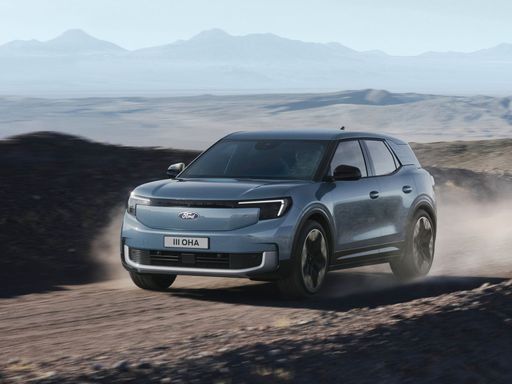 @ electricexplorer.fordpresskits.com
@ electricexplorer.fordpresskits.com
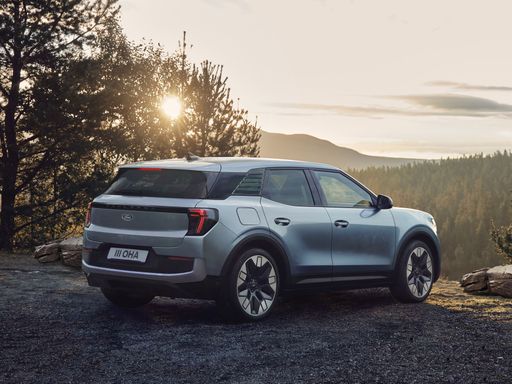 @ electricexplorer.fordpresskits.com
@ electricexplorer.fordpresskits.com
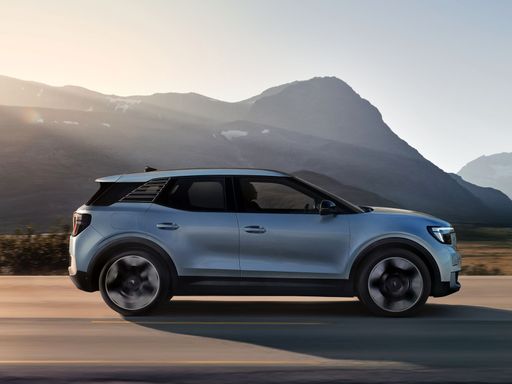 @ electricexplorer.fordpresskits.com
@ electricexplorer.fordpresskits.com
Hyundai i10
The Hyundai i10 impresses with its compact design, making it an ideal choice for navigating through busy urban environments. Its interior is surprisingly spacious, offering drivers and passengers comfort beyond what one might expect from a city car. The model combines efficiency and practicality, making it an attractive option for those seeking both economy and functionality in their daily commute.
details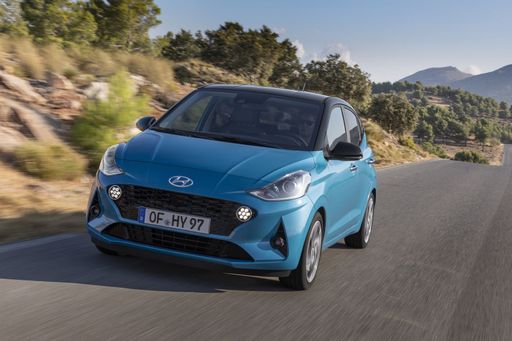 @ hyundai.news
@ hyundai.news
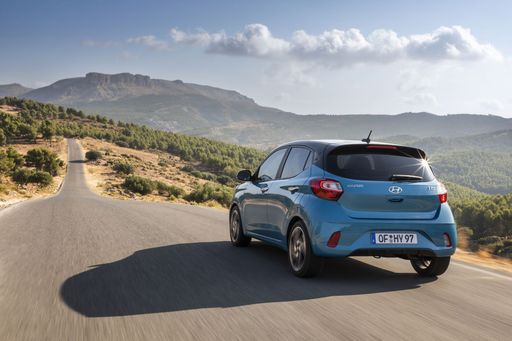 @ hyundai.news
@ hyundai.news
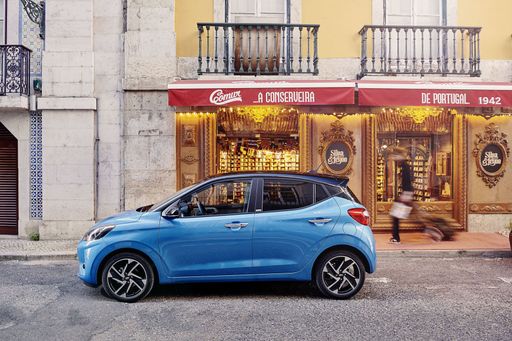 @ hyundai.news
@ hyundai.news
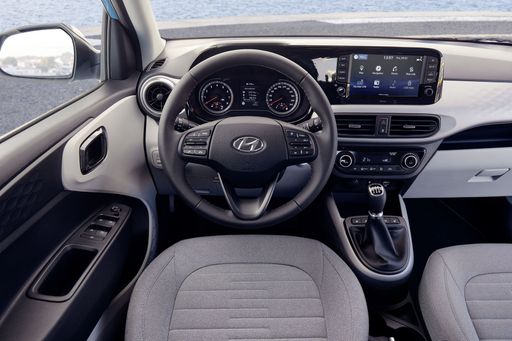 @ hyundai.news
@ hyundai.news
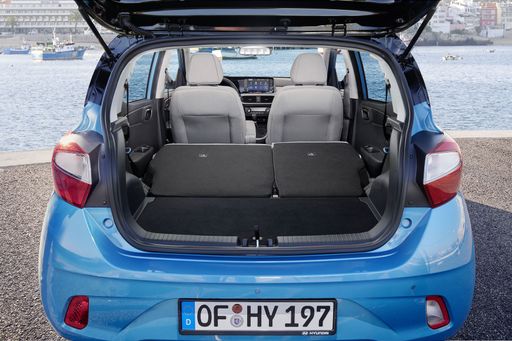 @ hyundai.news
@ hyundai.news

|

|
|
|
|
Costs and Consumption |
|
|---|---|
|
Price
34200 - 48800 £
|
Price
14600 - 19000 £
|
|
Consumption L/100km
-
|
Consumption L/100km
4.9 - 5.5 L
|
|
Consumption kWh/100km
14.5 - 17.2 kWh
|
Consumption kWh/100km
-
|
|
Electric Range
360 - 602 km
|
Electric Range
-
|
|
Battery Capacity
52 - 79 kWh
|
Battery Capacity
-
|
|
co2
0 g/km
|
co2
110 - 124 g/km
|
|
Fuel tank capacity
-
|
Fuel tank capacity
36 L
|
Dimensions and Body |
|
|---|---|
|
Body Type
SUV
|
Body Type
Hatchback
|
|
Seats
5
|
Seats
4 - 5
|
|
Doors
5
|
Doors
5
|
|
Curb weight
1908 - 2179 kg
|
Curb weight
996 - 1099 kg
|
|
Trunk capacity
445 - 450 L
|
Trunk capacity
252 L
|
|
Length
4468 mm
|
Length
3670 - 3675 mm
|
|
Width
1871 mm
|
Width
1680 mm
|
|
Height
1630 - 1639 mm
|
Height
1480 - 1483 mm
|
|
Payload
561 - 585 kg
|
Payload
344 - 423 kg
|
Engine and Performance |
|
|---|---|
|
Engine Type
Electric
|
Engine Type
Petrol
|
|
Transmission
Automatic
|
Transmission
Manuel, Automatic
|
|
Transmission Detail
-
|
Transmission Detail
Schaltgetriebe, Automatisiertes Schaltgetriebe
|
|
Drive Type
Rear-Wheel Drive, All-Wheel Drive
|
Drive Type
Front-Wheel Drive
|
|
Power HP
170 - 340 HP
|
Power HP
63 - 90 HP
|
|
Acceleration 0-100km/h
5.3 - 8.7 s
|
Acceleration 0-100km/h
11.4 - 18.4 s
|
|
Max Speed
160 - 180 km/h
|
Max Speed
143 - 175 km/h
|
|
Torque
310 - 679 Nm
|
Torque
93 - 172 Nm
|
|
Number of Cylinders
-
|
Number of Cylinders
3 - 4
|
|
Power kW
125 - 250 kW
|
Power kW
46 - 66 kW
|
|
Engine capacity
-
|
Engine capacity
998 - 1197 cm3
|
General |
|
|---|---|
|
Model Year
2024 - 2025
|
Model Year
2024
|
|
CO2 Efficiency Class
A
|
CO2 Efficiency Class
C, D
|
|
Brand
Ford
|
Brand
Hyundai
|
Ford Explorer EV
Unveiling the Future: The Ford Explorer EV
The all-new Ford Explorer EV makes a bold statement in the electric vehicle market with its amalgamation of cutting-edge technology, expansive features, and forward-thinking design. As Ford moves towards a more sustainable future, the Explorer EV stands out as a prime example of the brand's commitment to innovation and performance.
Power and Performance
Beneath its stylish exterior, the Ford Explorer EV boasts a powerful electric motor offering a range of power outputs from 170 PS to an impressive 340 PS. The vehicle provides either rear-wheel drive or an advanced all-wheel-drive system that ensures optimal traction and stability under diverse driving conditions. Thanks to its rapid acceleration, the Explorer EV races from 0 to 100 km/h in as little as 5.3 seconds, while maintaining a top speed of 180 km/h across its variants.
Battery Efficiency and Range
A major highlight of the Explorer EV is its varied battery options, which define its 'Standard Range' and 'Extended Range' models. With capacities ranging from 52 kWh to 79 kWh, the EV offers an impressive driving range of up to 602 km on a single charge. The electric consumption holds remarkable efficiency, varying between 13.9 kWh/100km and 16.6 kWh/100km, highlighting Ford’s innovation in energy management.
Interior Comfort and Technology
Inside, the Explorer EV exudes comfort with its high-quality materials and a spacious layout that accommodates up to five passengers. The vehicle is available in several trim levels, including the luxurious 'Premium' and 'Limited Edition', each outfitted with state-of-the-art technology. Drivers benefit from an intuitive infotainment system, comprehensive digital displays, and a variety of connectivity options that make every journey pleasurable and efficient.
Safety and Sustainability
Safety remains a priority for Ford, evident in the Explorer EV's suite of advanced safety features. The vehicle is equipped with cutting-edge driver-assistance technologies that work tirelessly to safeguard passengers with features such as adaptive cruise control and lane-keeping assist. Moreover, as a zero-emission vehicle, it proudly boasts a CO2 efficiency class rating of A, underpinning its eco-friendly credentials and Ford’s commitment to reducing the carbon footprint.
Pricing and Availability
The Ford Explorer EV is set to make waves with its competitive pricing. Starting between €42,500 and €57,200 depending on the trim and features, it offers exceptional value for those looking for a high-performing and sustainable SUV. The 2024 model is now available for order and promises to redefine expectations in the electric SUV segment.
Final Thoughts
The Ford Explorer EV embodies a harmonious blend of style, efficiency, and technological innovation. As a harbinger of Ford's electric future, it promises not just to meet but exceed the expectations of modern consumers by delivering an exceptional driving experience that is both versatile and responsible.
Hyundai i10
Introduction to the Hyundai i10
The Hyundai i10 has consistently proven to be a dependable and stylish companion for urban driving. Known for its compact design and efficiency, this hatchback offers a perfect blend of modern aesthetics and practicality, making it a popular choice for city dwellers and small families alike.
Performance and Efficiency
The Hyundai i10 is available with both manual and automatic transmissions, catering to various driving preferences. Engine power ranges from 63 to 90 PS, providing a versatile driving experience for both novice and seasoned drivers. The fuel consumption varies between an impressive 4.9 to 5.4 litres per 100 kilometres, fitting for those looking to minimise fuel costs while also reducing their carbon footprint.
Engine and Transmission
Equipped with a choice of 1.0-litre or 1.2-litre engines, the i10 offers up to 172 Nm of torque, ensuring lively performance. The models feature front-wheel-drive configurations, allowing for smooth handling and reliable road performance. The car excels in city driving but is equally capable on longer journeys.
Interior and Comfort
Despite its compact size, the Hyundai i10 does not compromise on interior space and comfort. It accommodates four to five occupants comfortably, offering sufficient legroom and headroom. Its flexible seating arrangement and a 252-litre boot make it ideal for both quick trips and weekend getaways.
Safety and Technology
Safety remains a priority with Hyundai, and the i10 is no exception. It comes equipped with multiple airbags, stability control, and advanced braking systems. Technology-wise, the i10 features a user-friendly infotainment system with smartphone connectivity, ensuring a pleasant and connected drive.
Design and Style
The Hyundai i10’s design is both modern and sleek, making it stand out in the compact hatchback segment. With a length ranging from 3670 to 3675 mm, a width of 1680 mm, and a height of 1480 to 1483 mm, the i10 strikes a perfect balance between style and functionality.
Affordable Pricing and Value
The i10 is available in several trims including the Select, N Line, and Prime, among others, with prices ranging from €16,990 to €22,190. Considering its features and low running costs — with monthly expenses estimated between €694 to €793 — the Hyundai i10 offers substantial value for those seeking an economical yet stylish hatchback.
Conclusion
The Hyundai i10 combines efficiency, modern design, and practicality in a compact package. Whether you are seeking a reliable city car or an economical daily driver, the Hyundai i10 is a strong contender worth considering in the compact car market of 2024.
The prices and data displayed are estimates based on German list prices and may vary by country. This information is not legally binding.
